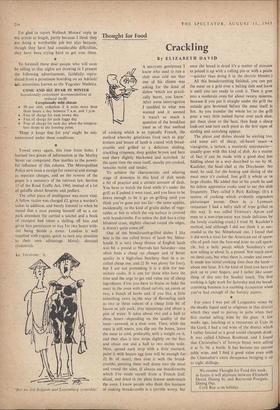Thought for Food
Crackling
By ELIZABETH DAVID To achieve the characteristic and alluring stage of doneness in this kind of dish needs a bit of practice and a certain amount of dash. You have to watch the food while it's under the grill, as if indeed it were toast, and you have to be brave enough to let it go on grilling until you think you've gone just too far—the same applies, incidentally, to the kind of gratin dishes of vege- tables or fish in which the top surface is covered with breadcrumbs. For unless the dish has a crisp blistered crust, slightly charred round the edges, it doesn't quite come off.
One of the breadcrumb-grilled dishes I like best is the one called breast of lamb Ste. Mdne- hould. It is very cheap (breast of English lamb was 8d. a pound at Harrods last Saturday—one often finds a cheap cut cheaper and of better quality in a high-class butchery than in a so- called cheap one, and 21 lb. was plenty for four), but 1 am not pretending it is a dish for ten- minute cooks. It is one for those who have the time and the urge to get real value out of cheap ingredients. First you have to braise or bake the meat in the oven with sliced carrots, an„onion or two, a bunch of herbs and, if you like, a little something extra in, the way of flavouring such as two or three ounces of a cheap little bit of bacon or salt pork, plus seasonings and about a pint of water. It takes about two and a half to three hours—depending on the quality of the meat—covered, in a slow oven. Then, while the meat is still warm, you slip out the bones, leave the meat to cool, preferably_with a weight on it, and then slice it into strips slightly on the bias and about one and a half to two inches wide. Next, spread each strip with a little mustard, paint it with beaten egg (one will be enough for 21 lb. of meat), then coat it with the bread- crumbs, pressing them well down into the meat and round the sides. (1 always use breadcrumbs which I've made myself from a French loaf, sliced, and dried in the plate drawer underneath the oven. I know people who think this business of •making breadcrumbs is a terrible worry, but once the bread is dried it's a matter of minutes to pound it up with a rolling pin or with a pestle —quicker than doing it in the electric blender.) All this breadcrumbing finished, you can put the meat on a grid over a baking dish and leave it until you are ready to cook it. Then it goes into a moderate oven for about twenty minutes, because if you put it straight under the grill the outside gets browned before the meat itself is hot. As you transfer the whole lot to the grill pour a very little melted butter over each slice, put them close to the heat, then keep a sharp look-out and turn each piece as the first signs of sizzling and scorching appear.
The plates and dishes should be sizzling too, and some sort of sharp, oil-based sauce—a vinaigrette, a tartare, a mustardy mayonnaise— usually goes with this kind of dish. As a matter of fact it can be made with a good deal less fiddling about in a way described to me by M. Kaufeler, the head chef at the Dorchester. No need, he said, for the boning and slicing of the meat once it's cooked. Just grill it whole or in large chunks. He added that in his youth he and his fellow apprentice cooks used to eat this dish frequently. They called it Park Railings. (It's a system of cooking which evidently engenders picturesque names. Once in a Lyonnais restaurant I had a hefty slab- of tripe grilled in this way. It was called Fireman's Apron and even to a non-tripe-eater was made delicious by the lovely crackling crust.) I tried M. Kaufeler's method, and although I did not think it as suc- cessful as the Ste. Mdnehould one, I found that it did• work a treat for the American cut of spare- ribs of pork (not the fore-end joint we call spare- rib, but a belly piece) which Sainsbury's are now selling at about 2s. a pound. Not much meat on these cuts, but what there is, tender and sweet. It needs less initial cooking time than the lamb— about one hour. It's the kind of food you have to pick up in your fingers, and I rather like some- thing of this sort for Sunday lunch. The first cooking is light work for Saturday and the bread- crumbing business is a soothing occupation when you've had enough of the Sunday papers.
* For years I was put off Languedoc wines by the deadly liquid said to originate in that district which they used to purvey in pubs when they first started selling wine by the glass. A few weeks ago, lunching at a restaurant at Uzes in the Gard, I had a red wine of the district which I rather fancied as a good sound cheapish drink. It was called Chateau Roubaud, and I found that Christopher's of Jermyn Street were selling it at 7s. 9d. a bottle. It has become my current table wine, and I find it good value even with the Chancellor's extra threepence bringing it no to eight shillings.
We resume Thought for Food this week : in future it will alternate between Elizabeth David, Dining In, and Raymond Postgate, Dining Out.
Cyril Ray is on holiday.






























 Previous page
Previous page